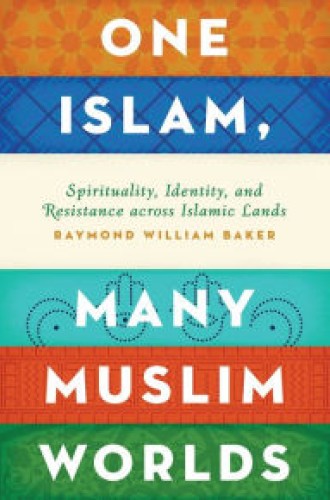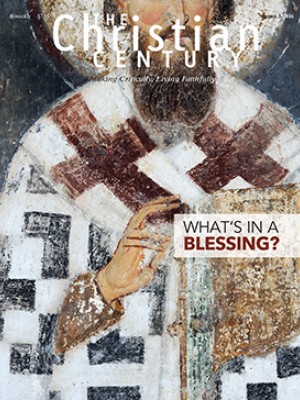Celebrating centrist Muslims
Raymond Baker offers some good news amid the gloom of global terrorism, opening up the little-known world of wasatiyya—or centrist—Islam. It is the Islam of the “new” intellectuals of the “Islamic Revival,” including legal scholar Mohammed al-Ghazali (d. 1996); journalist Fahmi Huwaidi; Al Jazeera broadcaster Yusuf al-Qaradawi; and politicians Necmettin Erbakan (d. 2011), Alija Izetbegovic (d. 2003), and Rachid Ghannouchi. Baker sees these leaders as “heralds” of an “Islamic renewal” who hold sway over a majority of Muslims around the world through their thinking and writing on globalization, democracy, social justice, and freedom.
Baker, who teaches international politics at Trinity College in Hartford, Connecticut, and political science at the American University in Cairo, provides a scathing critique of Western—and particularly American—imperialism. Reacting to orientalist attitudes and to the work of his mentor Samuel Huntington, he seizes every opportunity to remind the reader that many of the present crises in the Middle East have arisen as a result of the West’s ill-considered interventions, greed, and ineptitude. This criticism is particularly refreshing coming from an American, albeit one who has spent a large part of his adult life living in Cairo and traveling in Islamic lands.
Read our latest issue or browse back issues.
The title suggests that Baker offers a grand tour of the great diversity of expressions of Islam around the world. Instead, the book is a narrowly focused exploration of one particular stream, which the author terms the “River of Life.” Baker is clearly enamored of the Qur’an, which he quotes freely, and he seems to identify with Islam without declaring allegiance to it. He sees the wasatiyya as representing “Islam itself,” as though he has the authority to pronounce it the correct interpretation. On the other streams within Islam he has little to say. In a few sentences he writes off “inherited Islamic institutions like Al-Azhar,” the leading Sunni university in the world, as “docile official Islam.” He labels interpretations of Islam that espouse violence “criminal versions of Islam” and deems them unworthy of further discussion or explanation. He does not discuss progressive Muslims such as Abdullahi an-Na‘im, who advocates a form of secular state, or feminists such as Fatema Mernissi.
Geographically Baker’s gaze is fixed on what he calls the “Islamic strategic triangle”: the “three great demographic and cultural reservoirs” of Egypt, Turkey, and Iran. In his recounting, all great Islamic thought has hailed from these three countries. Apart from an occasional mention, the great majority of the world’s 1.6 billion Muslims disappear into obscurity; Asian and African Muslims are completely unrepresented. Even “retrograde Wahhabi Islam” receives scant mention, despite its colossal influence. Baker mentions the Salafis even less.
Doubtless such movements do not fit with Baker’s romanticized view of Islam and Shari‘a as “open, inclusive, and responsive to the world.” Yet they cannot and should not be ignored. They are legitimate examples of the “many Muslim worlds” announced in the book’s title.
Controversially, Baker suggests that Muslims do not need to follow the example of Muhammad literally. He insists that Islam promotes equality, justice, and freedom, but some of the paragons whom he quotes have not been so convinced. The issue of apostasy has become a touchstone for many for assessing the claims of Islam. Both al-Ghazali and al-Qaradawi hold traditional conservative views on the treatment of apostates. In one court case, al-Ghazali, a professor of Islamic law, famously supported the death penalty and private assassination for apostates. Although al-Qaradawi tolerates minor—that is, private—apostasy, he insists on the death penalty for major apostasy—apostasy that has been made public. Not all Muslims agree with al-Ghazali and al-Qaradawi, but it will be difficult for many non-Muslims to understand how the wasatiyya can claim to promote justice and freedom while such views persist.
Many Christians will be disappointed by Baker’s representation of the Christian faith. He seems to compare suicide bombers with early Christian martyrs. The only explicit quotes from Christians are ill-judged, derogatory remarks about Islam made by the likes of Jerry Vines, Franklin Graham, and Jerry Falwell. Baker makes no reference to Christians who have sought to understand Islam fairly, and he misses the points at which Christian thought might shed light.
Baker’s final conclusion is the most telling. Baker comments that “Jesus, the Savior of Christianity, returned to his Father in heaven. The Holy Qur’an remained on earth to provide guidance for humanity’s spiritual and worldly struggles.” Christianity, therefore, has nothing to say to the world today. Baker does not mention the Bible, the Holy Spirit, the reign of God, or the church. For him “the Message”—presumably as interpreted by the wasatiyya—“came from God.” Islam alone “inspires humanity” today.
One Islam, Many Muslim Worlds corrects an imbalance by highlighting centrist Islam and reminds the West of its own history of violent imperialism, much of it perpetrated in the name of religion. But Baker fails to appraise adequately and critically Islam’s texts and history in the light of the great diversity of Muslim worlds. The book thus falls short of the potential and promise of its title.






